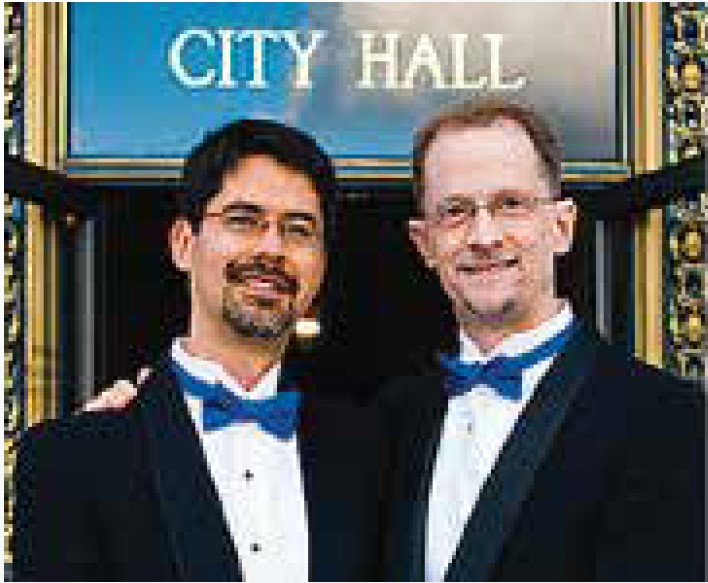
By John Lewis and Stuart Gaffney–
When Taiga Ishikawa, the first openly gay man to serve in the Diet (Japanese Parliament), visited the exquisite GLBT Historical Society Museum in the Castro last week, queer history came alive for him as it has done for countless other museum visitors.
Ishikawa, currently the only openly LGBTIQ Diet member, is leading the charge for advancement of LGBTIQ rights in Japan’s national legislature. Harvey Milk has long been a hero to Ishikawa. When Ishikawa viewed the solemn display of the suit that Milk was wearing when he was assassinated, the Japanese leader reflected through a translator:
“Years ago I saw the Harvey Milk movie and it really inspired me. I wanted to be like him. And so, I’ve been working hard since then. And he was killed when he was 48 years old. I am 48 this year—so it really gives me a lot to think about. Everything he left behind. His legacy. Everything that you are treasuring here. I really want to walk in those footsteps in Japan. Carry on that legacy.”
Ishikawa, clearly a student of LGBTIQ history, also already knew about another San Francisco legend, José Sarria, who is also featured prominently in the museum. Sarria was a San Francisco drag community pioneer and dynamic local performer, who was the first known openly gay person to run for elective office back in 1961. Ishikawa seemed clearly inspired to see the museum’s display of Sarria’s military photo, coupled with the lavish costume kimono Sarria wore on stage in Madama Butterfly, along with Sarria’s political campaign poster.

Ishikawa explained he believed that Sarria was politically “very empowering” because, even though he didn’t win, “he got a lot of votes,” thereby making “the community stronger.” Ishikawa drew a parallel to the emerging visibility of LGBTIQ Japanese politicians today, where in the latest Diet election four openly LGBTIQ candidates ran. Although all unfortunately lost, including Otsuji Kanako, the first elected openly LGBTIQ Diet member, Ishikawa emphasized “just the fact that they were running for office in itself is very important.”
Just like Milk and Sarria before him in San Francisco, Ishikawa spoke boldly about the political change needed in Japan today to achieve marriage equality and other critical legal protections against LGBTIQ discrimination.
Since the tragic July 8 assassination of former Japanese Prime Minister Shinzo Abe, Japan has been engulfed in political upheaval with revelations of close ties between the conservative South Korean based Unification Church, founded by the controversial Reverend Sun Myung Moon, and conservative leaders in the ruling Liberal Democratic Party (LDP), including Abe. Abe and his political allies for years stymied progress on marriage equality and other anti-discrimination laws in the Diet.
Ishikawa, a member of the opposition Constitutional Democratic Party (CDP), explained: “We have known actually for quite a long time that the Unification Church is behind blocking gay marriage, and that they have been influencing the ruling Liberal Democratic Party. The general public did not know that. It was also taboo to talk about that in political circles. But now that is changing.”
The Unification Church is known for its exploitative fundraising tactics. Ishikawa described it as “more of a cult than a religion,” explaining how they have “tricked and brainwashed a lot of (Japanese) people into giving them a lot of money.” According to an August Kyodo News survey, at least 82 LDP Diet members had some connection with the church.
Ishikawa emphasized: “I think it’s extremely important right now to expose those crimes so that the politicians will sever their ties with the Unification Church. I really want to spread the word to people that the fact this criminal organization had strong ties to the Japanese government was a big problem.”
Ishikawa explained that, according to Japanese polling, “more than 70% of the populace supports marriage equality” and that when he talks directly with LDP leaders, “there are actually many people who are very supportive of marriage equality.” He believes that, if the LDP severs its ties with the Unification Church, “it’s going to mean a huge change to attitudes in regard to marriage equality” in the Diet, and “it might be surprisingly easy to establish gay marriage.” He added that he hoped his own CDP party comes to power to do that as well as to enact many other laws supporting LGBTIQ people and other disadvantaged minorities in Japan.
After giving Ishikawa an intimate and in-depth tour of the multi-faceted museum, Direct of Development & Communications Andrew Shaffer, who hosted Ishikawa along with the Historical Society’s Mark Sawchuk and Leigh Pfeffer, explained, “We don’t like history to just live on a shelf and be a lesson from the past. We want it to be something people can learn from and actively use in their daily life.”
Ishikawa responded: “I really want to bring back that empowered way of thinking to Japan when I go home … . I really feel that, in this museum, there are a lot of things that give that message of hope, and I really appreciate that … I really received energy and power from you.”
Ishikawa is now back in Japan making new history along with many other inspiring Japanese LGBTIQ activists. Indeed, we all continue to walk in each other’s footsteps.
John Lewis and Stuart Gaffney, together for over three decades, were plaintiffs in the California case for equal marriage rights decided by the California Supreme Court in 2008. Their leadership in the grassroots organization Marriage Equality USA contributed in 2015 to making same-sex marriage legal nationwide.
6/26 and Beyond
Published on September 8, 2022
Recent Comments